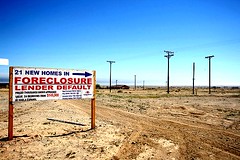Smart, sustainable development can aid economic recovery

Posted October 14, 2008 at 2:21PM
I don't know about you, but I'm finding it a little hard these days to stay focused on the environment and sustainable land development while life as we know it seems to be tinkering somewhere between precarious and going to hell in a handbasket. The Dow plunges down 600 points, then 800 more, then up 900, sometimes seemingly all in the same day; the overall feeling is that the US and world economies have been going down the toilet, taking my retirement savings with them; at best, it's going to cost us hundreds of billions of dollars to untangle this mess, meaning everything else  is going to have to sacrifice; in fact, hardly a day goes by that I don't get an increasingly dire email warning that NRDC staff needs to cut costs NOW.
is going to have to sacrifice; in fact, hardly a day goes by that I don't get an increasingly dire email warning that NRDC staff needs to cut costs NOW.
Meanwhile, we're having the nastiest season of electoral politics I can remember and, oh yeah, those two wars that have made my country and my city less safe aren't going away anytime soon, even if they have been pushed off the front page.
It can be easy to get distracted, to say the least. But I'm paid to stay on the job. So this post is going to link our recovery from the economic mess with smart growth - something that, fortunately, is well-supported by the facts.
No question about it: whatever Wall Street does next, we're going to have to find more efficiencies in our economy. Consumers are going to have less to spend on things like housing, utilities, and transportation; developers are going to have less to invest; local governments are going to need to cut costs on infrastructure and services because of lower tax revenues; and those lenders that are still standing are going to be much more conservative in financing anything. Smart growth helps on all counts.
In particular, for consumers, smart growth saves money. Substantial savings in transportation costs are realized in close-in, accessible neighborhoods, particularly those with good transit service. It's all part of the "new economics of place," in Scott Polikov's phrase, and it is causing formerly sprawling suburbs to re-invent themselves in smarter ways to remain relevant and viable.
 For developers and lenders, it has become clear that traditional sprawl just doesn't sell like it used to. As reported recently on this blog, some developers are even selling their speculative land back to become farms again. To be viable in the new economy, developers will increasingly turn to smart-growth models, in good locations, just about the only ones left where values have remained relatively stable.
For developers and lenders, it has become clear that traditional sprawl just doesn't sell like it used to. As reported recently on this blog, some developers are even selling their speculative land back to become farms again. To be viable in the new economy, developers will increasingly turn to smart-growth models, in good locations, just about the only ones left where values have remained relatively stable.
For municipalities, compact communities in or adjacent to places where there is already infrastructure save both capital costs and operation and maintenance costs.
As a result, while sprawl as we have known it may not be dead yet, it is not well, and I am not the only one who believes we may be seeing the beginning of its end. Writing for citiwire.net, Peter Katz contends that it is time for the federal government to get on the bandwagon and write criteria for the emerging new recovery apparatus that reflect the economic superiority of smarter urbanism:
"There's a critical 'place' story beyond the carelessness and/or chicanery of subprime mortgage lenders and resellers who precipitated the crisis that's triggered a $700 billion federal bailout and global financial jitters.
"It's the brutal geographic sorting out of winners and losers among the residential properties we call home . . . In his study Driven to the Brink, researcher Joe Cortright identifies an emerging pattern of home
price fluctuations spanning many U.S. regions. 'Distant suburbs,' he writes, 'have seen the biggest declines, while values in close-in neighborhoods have held up better, and in some cases continued to increase' . . .
"Maybe it's time, even as the billions of bailout dollars flow, for official Washington to get tough. It's emerging as lender of last resort, asset manager for the wounded American taxpayer, assuming the responsibility for thousands of toxic mortgages on property that more diligent local planners might never have allowed to be built. So why could Washington not advocate - maybe even require as a price for the potential subsidies and loan insurance it may offer - compliance with planning rules aimed at promoting more economically robust, resource-efficient communities?
"Indeed, with solid place-based, home price data like Cortright's, we now have information one could 'take to the bank' in the form of 'smart growth' underwriting standards to push qualified projects to the front of the line for speedy loan approval.
"Experience in the recent boom/bust cycle, and others before it, suggests that local realtors, bank loan officers, city council members, the folks who wittingly or unwittingly built the unsustainable sprawl development we have today, could benefit from the discipline of a strongly recommended - or even mandatory - checklist of more rational, community planning rules. And so too, in the long run, would federal taxpayers if the smart rules became the norm, not - as today they often still are - the exception."
That all sounds logical to me. Peter's full article may be found here.